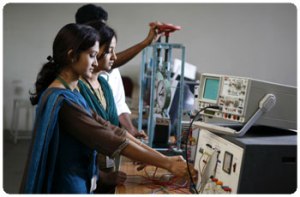Blog Archives
THE EDUCATION MISSION
Posted by Debug Right
As technology continues to evolve, so does teaching! In the past when there was a huge emphasis on rote learning, the mindset is shifting to a more hands-on kind of training methodologies. At the heart of it, engineering colleges in India are realizing the importance of preparing their students to think creatively.
Focus on Creative Thinking
At Tektronix, we have understood this and are working closely with many educational institutes in the country. With the rapid pace of change in the electronics industry, educators are finding it increasingly challenging to keep their curriculum current with the latest advances. Staying current is particularly important – and daunting – in embedded systems design. For example, our Educator’s Resource Kit is designed to help you prepare your engineering lab curriculum with the latest standards and techniques for test and measurement. The comprehensive kit includes six different labs with accompanying instructor’s guides, reference fact sheets a basic concept book for students, in addition to a training board to provide real-world signals during the labs.
The Educator’s Resource Kit offers an easy-to-implement method to keep electrical engineering curriculum up to date. We have had a long history of partnership with leading educational institutions throughout the world, and this is the most recent product of those relationships.
This goes a long way in helping educators to impart problem-based learning skills, a design to match lab time; which can scale from 2-4 hours and provide detailed instructor guides. These instructor guides comes with helpful hints to students to perform experiments, gives answers to exercises and supports all experiments.
Further, the reference fact sheets is designed specifically for students, covers basic test and measurement theory and the reference tools that come along with it can be used during lab time.
The kit is designed to help ensure that students are prepared to be immediately productive in the workplace and able to use the latest in test and measurement instrumentation. Today, virtually every electronic product developed has an embedded system, may contain microprocessors, microcontrollers, DSPs, RAM, Flash, EEPROMs, FPGAs, A/Ds, D/As,serial and parallel buses, embedded audio and switch-mode power supplies. Students need to be trained on the test equipment and procedures used to design and troubleshoot these multi-component embedded systems. The labs in the Educator’s Resource Kit address the most common challenges faced in the electronics industry today.
The new kit provides a complete set of instructional materials to upgrade lab curriculum to feature the latest and most commonly used test equipment. Materials include six different scalable, problem-based laboratory experiments with an instructor’s guide and student reference fact sheet for each experiment, a training board to provide real-world signals for the lab experiments and an Oscilloscope Reference Guide that mounts directly on the oscilloscope and details the common controls and features of today’s digital oscilloscopes. Labs cover such topics as Introduction to Oscilloscopes, Introduction to Arbitrary/Function Generators, Parallel and Serial Bus Analysis and Debugging a Digital Design.
In addition to the new Educator’s Resource Kit, we believe in empowering them by offering a free Fundamentals Library of 15 technical papers covering basic concepts to advanced test and measurement techniques. For example, Oscilloscope Fundamentals explains how oscilloscopes work, describes different types of oscilloscopes, outlines electrical waveform types, reviews basic oscilloscope controls, and explains how to take simple measurements.
The industry has been doing the bulk of work to get the academia to understand the importance of enabling their students to on-hands training. Colleges like BVB College of Engineering and Technology, H.R.H. The Prince of Wales Institute of Engineering & Technology, Nettur Technical Training Foundation, amongst other engineering colleges are using some of the latest equipments.
The successful future engineer will have to possess strong analytical skills, creativity, good communication skills, business and management knowledge, leadership, high ethical standards, dynamism, agility, a pursuit of lifelong learning, as some of the many skill-sets. These skill-sets combined with exposure to tools that will help an engineer in putting to practice the acquired practical knowledge would shape the person’s future.
In the past, educators could afford to take their time in learning about things. However, in a dynamic world that we live in, there is a constant need to create an environment that makes it easier to develop and distribute lab material to students. The sooner educators understand this, better it would be for students and the country. In a country which has an estimated 4,000 engineering colleges with 15 lakh seats, there is a crying need to look at hands-on training methodologies.
By Team Debug Right
Posted in EDUCATION
Tags: A/Ds, D/As, DSPs, education, Educator’s Resource Kit, educators, EEPROMs, electrical engineering curriculum, electronics industry, embedded systems design, Flash, FPGAs, India, microcontrollers, microprocessors, RAM, serial parallel buses, Technology education, Tektronix, world

